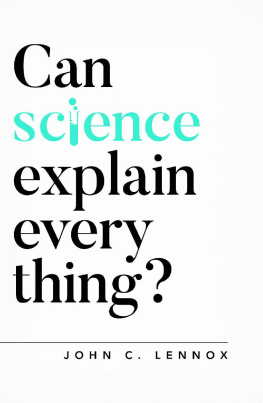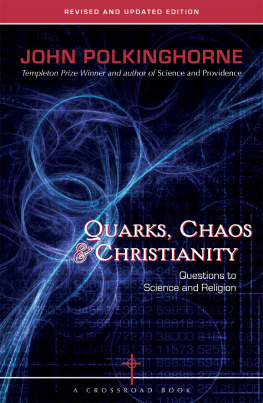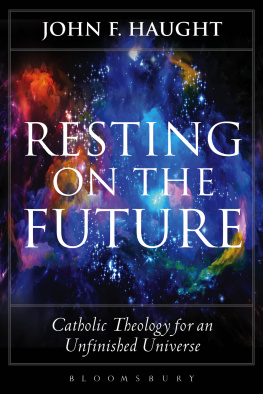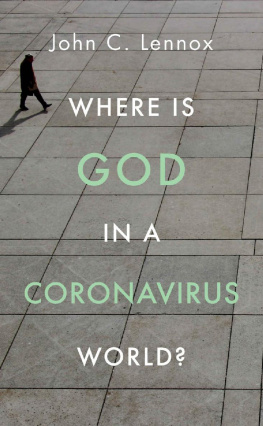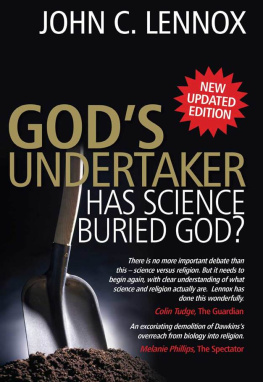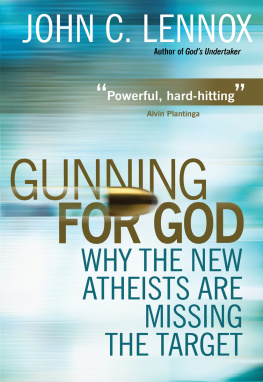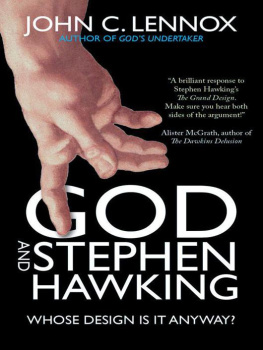Can science explain everything?
John Lennox, 2019.
Published by
The Good Book Company in partnership with
The Oxford Centre for Christian Apologetics
The Zacharias Institute
Email (North America): info@thegoodbook.com
Email (UK): info@thegoodbook.co.uk
Websites:
UK & Europe: www.thegoodbook.co.uk
North America: www.thegoodbook.com
Australia: www.thegoodbook.com.au
New Zealand: www.thegoodbook.co.nz
Unless otherwise indicated, Scripture quotations are from The Holy Bible, English Standard Version (ESV), copyright 2001 by Crossway, a publishing ministry of Good News Publishers. Used by permission. All rights reserved.
ISBN (ebook): 9781784984120
ISBN (print): 9781784984113
All rights reserved. Except as may be permitted by the Copyright Act, no part of this publication may be reproduced in any form or by any means without prior permission from the publisher.
Design by Andr Parker
Preface
This book has been written in response to many young people and adults who have asked for an introduction to the Science and God debate that would be more accessible than my book Gods Undertaker: Has Science Buried God? In addition, many of them asked me to deal more specifically with the relationship between Christianity and science as distinct from restricting myself to evidence for the existence of God. I hope they will find this little book goes some way to meeting their requests.
John C. Lennox
Oxford, April 2018
Introduction: Cosmic chemistry
Make a search on the subject of science and religion, and it will take only a few clicks to convince you that you have stepped into a war zone.
In comment threads on almost every conceivable subject in sciencefrom bioethics and psychology to geology and cosmologyyou will find hostile exchanges and name calling from two sides which you are convinced would never meet across a negotiating tableeven if the United Nations called a ceasefire.
There is what we might call, for convenience, the science side. They view themselves as the voice of reason. They believe they are working to roll back the tide of ignorance and superstition that has enslaved mankind since we crawled out of the primeval slime. If I can summarise their position, it is this:
Science is an unstoppable force for human development that will deliver answers to our many questions about the universe, and solve many, if not all, of our human problems: disease, energy, pollution, poverty. At some stage in the future, science will be able to explain everything, and answer all our needs.
They may also be assuming that, at some stage in the future, science will provide the answers to at least some of our big questions in life: Where do we come from? What are we here for? What is the meaning of our existence?
At the other extreme, there is what we might for convenience call the God side. They hold that a divine intelligence is behind everything there is and everything we are. They are looking for, and even claim to have found, the answers to the same big questions that scientists ask, but in a very different place. They look to the complexity and wonder of the universe and our astonishingly rich and diverse blue planet, and find it to be self-evident that there is a wonderful mind behind our beautiful and amazing world. They seem surprised that there could be people who do not see things this way.
Sometimes the result is fighting and name-calling in intemperate encounters that generate more heat than light.
It is therefore not surprising that many people conclude that God and science do not mix ; like when you drop metallic sodium or potassium onto water, there is a lot of fizzing and fire and heat ending with a loud bang.
But what if there were another way of looking at this whole business? What if we have been fooled into a pointless war based on misinformation and wrong thinking? It would not be the first time. What if there were a different kind of cosmic chemistry to the one that ends with an explosion?
Where I am coming from
Geographically, I come from Northern Ireland, which is a place that sadly has a dubious reputation when it comes to the God question. I grew up in a country that was riven by a deep sectarian and cultural divide, popularly represented as a battle between Protestants and Catholics (although, of course, it was much more complicated than that). It led to three decades of brutal murder, bombings and terrorism collectively known as the Troubles.
In the middle of all this my parents were remarkable people. They were Christians, yes, but they were not sectariana difficult stance for anyone in those days. My father showed that lack of sectarianism by employing people in his store from across the religious divide. It was bombed for that, and my brother was seriously injured in the blast. Terrorism hit our home in a very real way.
I owe my parents a lot, but perhaps the biggest thing was that they loved me enough to give me space to think for myself; not a common thing in my country, I regret to admit, as there was much bigotry and entrenched opinion. I was also grateful that when I arrived at Cambridge University in the autumn of 1962, I had already been encouraged by my parents to read widely and to think deeply about worldviews other than Christianity.
Subsequently, I have been privileged to talk about these issues and debate the relevant arguments in public for the last 20 years with leading atheists, of whom the world leader is probably still Richard Dawkins, who, like myself, is a professor at Oxford University. I have always tried to treat people with different worldviews from my own with respect, and to find out how they arrived at their position, and why they feel so passionately about it.
It may be that you are reading this, and you feel strongly that science is sufficient to explain everything, and that there is no place for God in the world any more. Or it may be that you are just curious and want to get some perspective on this question. Whoever you are, I hope you enjoy reading this introduction to the question, and that it stimulates you to approach this question in a scientific way: that is, open to what the outcome may be, and prepared to follow the evidence where it leads, even if that may turn out to be uncomfortable for you in some way.
I want to suggest that the popular idea that science and God do not mix is simply not true, and that it is relatively easy to establish that. In this short book, I want to examine many of the misconceptions people have, not just about faith and belief in God but about science itself. In doing so, I want to show that there is a different way of looking at things that is more rational, more sensible, and more wholesome than the all too familiar alleged conflict between science and religion.
I want to suggest that a different kind of cosmic chemistry is possible: that there is a different kind of reaction between science and religion that is truer to the spirit and essence of both, and more fruitful than the tired and entrenched debate that we see played out all around us.
Hydrogen and oxygen, like potassium and water, also form an explosive mixture, but the end result could not be more differentrefreshing, life-giving water.
1. Can you be a scientist and believe in God?
Surely you cant be a scientist and believe in God these days?
Its a viewpoint I have heard expressed by many people over the years. But I suspect that it is often the unspoken doubt that stops many from engaging seriously with serious thinkers about both science and God.

